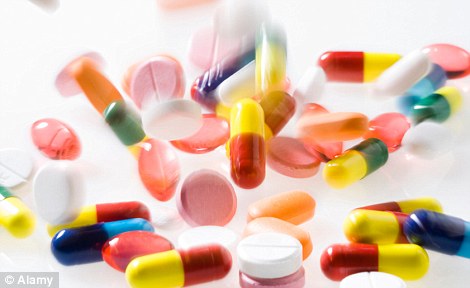1. Vitamin C (Ascorbic Acid)
Benefits:
Enhances recovery and growth in muscle cells. Vitamin C is also an antioxidant.
Involved in the formation of Collagen, the primary constituent in connective tissue. As you lift heavier weights, you put more stress on your structure. If your connective tissue is not as strong as it should be you have a much higher risk of injury.
Helps in the absorption of Iron. With an Iron deficiency, the amount of oxygen that gets bonded to hemoglobin in the blood decreases and muscular performance is greatly reduced.
Diffuses very rapidly in water. Since a muscle cell is mostly water, the more muscular an athlete becomes, the more vitamin C disperses and the lower the concentration of this critical substance becomes in body tissues. So vitamin C requirements are greatly increased for athletes.
Vitamin C assists in the formation and release of steroid hormones, including the anabolic hormone testosterone.
Dietary sources: The largest sources of vitamin C are present in citrus fruits and fruit juices.
2. Vitamin B6 (Pyridoxine)
Benefits:
The only vitamin directly tied to protein intake. The greater protein consumption, the greater amount of vitamin B6 you need.
Vitamin B6 makes it possible for protein metabolism, growth and carbohydrate utilization to take place.
Dietary sources: Avocados, nuts, liver, chicken, fish, green beans, field salad, wheat germ, nutritional yeast, sea vegetables, and bananas are particularly good food sources.
3. Vitamin B1 (Thiamine)
Benefits:
Required for protein metabolism and growth.
Involved in the formation of hemoglobin which is a protein found in red blood cells that transports oxygen to working muscles in the body.
Oxygen transportation becomes increasingly more important to athletic performance as intensity and duration of exercise increase.
As the amount of exercise, intensity, and duration of exercise increase, the more thiamine is needed.
Dietary sources: Green peas, Spinach, Liver, Beef, Pork, Navy beans, Nuts, Pinto beans, Bananas, Soybeans, Goji berries, Whole-grain and Enriched Cereals, Breads, Yeast,the aleurone layer of unpolished rice, and Legumes.
4. Vitamin D
Benefits:
Vitamin D is necessary in the absorption of Calcium and Phosphorus. If adequate stores of Calcium are not available in the muscle, full and hard muscular contractions will not be achieved.
Quick, powerful muscular contractions are provided by Phosphorus. Phosphorus is also required for the synthesis of ATP.
Dietary sources: No-fat or low fat MILK.
5. Vitamin B3 (Niacin)
Benefits:
Involved in nearly 60 metabolic processes related to energy production.
Nicotine acid, a form of Niacin, causes vasodilatation which can help competitors looks more vascular on stage. Large doses of Nicotine acid drastically impairs the body’s ability to mobilize and burn fat.
Dietary sources: Turkey meat (the body uses the amino acid tryptophan to create Niacin), dairy products, poultry, fish, lean meats, nuts, and eggs.
6. Vitamin E
Benefits:
Used in protection of cell membranes since it is a powerful antioxidant.
Recuperation and growth of muscle cells is dependant on healthy cell membranes.
Dietary sources: Vegetable oils, nuts, green leafy vegetables, and fortified cereals are the most common food sources of vitamin E.
7. Vitamin A
Benefits:
Vitamin A helps with vision.
Important in the synthesis of protein (muscle growth!!!).
Involved in the production of Glycogen (the body’s form of energy for high intensity activities).
Very important for contest preparation.
Dietary sources: Milk, liver, sweet potatoes.
8. Vitamin B2 (Riboflavin)
Benefits:
Involved in 3 main processes: 1) Glucose metabolism, 2) Oxidation of fatty acids, and 3) The shuttling of Hydrogen through the Krebs cycle (also known as the citric acid cycle where certain molecules are broken down into energy in the form of ATP).
For bodybuilding purposes, riboflavin is related to protein metabolism. There is a strong relationship between lean body mass and dietary riboflavin.
Dietary sources: Liver, almonds, soy nuts, shellfish, milk and other dairy products, and eggs.
9. Biotin
Benefits:
Critical in amino acid metabolism and production of energy from many sources.
Bodybuilders who eat raw egg whites gain a substance called Advin, which blocks biotin absorption.
Dietary sources: Egg yolk, liver, kidney, pancreas, milk, soya, and barley.
10. Vitamin B12 (Cobalamin)
Benefits:
Carbohydrate metabolism and maintenance of nervous system tissue (spinal cord, nerves that carry signals from the brain to muscle tissue).
The stimulation of muscles via the nerve cells is a critical step in the contraction, coordination, and growth of muscles.
Dietary Sources: B12 is only available from foods of animal origin (beef, chicken, fish, pork, etc.)
by extremebodyfit



Post your comment